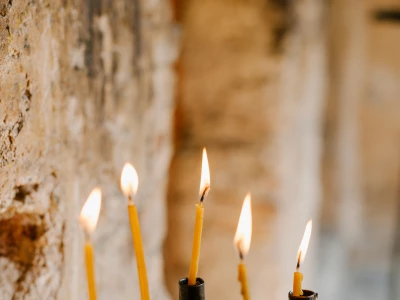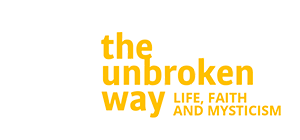Share this article
Why You Need Spiritual Discipline To Flourish

You Gotta Do The Work – A Short Story
‘How do you keep going?’ I asked my late wife Cushla one morning after breakfast in bed. She had been feeling particularly poorly in the last couple of days but was determined to go to work in our business. I was in awe of her mental toughness and resilience despite being ill.
‘How do you think?’ she replied, smiling at me and pointing upwards to heaven. She meant that she wasn’t relying on her own resources ⸻she was drawing on supernatural power.
She had borne a mysterious, debilitating illness for years now, but her strong faith and devotion to her spiritual and religious practices had massively strengthened her indomitable spirit. She had also grown to be remarkably calm and could bounce back from disappointments or upsets in no time at all. Another adjunct to her religious devotion was that her spiritual gifts grew exponentially, especially her prophetic ability.
Friends sometimes asked me how Cushla was so in touch with the supernatural. I would always tell them: ‘If you did the spiritual work she did, you would be too.’ Dr Eben Alexander, an American neurosurgeon and the author of the best-selling book, Proof of Heaven: A Neurosurgeon’s Journey into the Afterlife, says much the same: ‘...you don’t have to almost die to glimpse behind the veil—but you must do the work. Learning about that realm from books and presentations is a start—but at the end of the day, we each have to go deep into our own consciousness, through prayer or meditation to access these truths.’
I hadn’t done nearly enough of the work, but Cushla sometimes channelled messages for me from the spirit world. ‘Put God first’ was one such message she had received one day, probably from the Holy Spirit.
Even though I believed in God, I certainly hadn’t put Him first in my life for a long time. Instead, I had invested enormous energy into chasing worldly ‘success’. I paid the price with feelings of emptiness, alienation and lack of meaning. Cushla, on the other hand, despite having low energy and having to look after her family and work part-time, never reneged on her commitment to God and her spiritual and religious practices, which included daily meditation, praying and attending Mass. Although it wasn’t the aim of her religious devotion, the therapeutic benefits that she gained from her faith were tremendous, including flourishing mental health and happiness.

‘Do you have less respect for your own nature than the engraver does for engraving, the dancer for dance, the miser for money or the social climber for status? When they’re really possessed by what they do, they’d rather stop eating and sleeping than give up practising their arts.’
— Marcus Aurelius, Roman Emperor and Stoic philosopher
But I Don't Have The Time For Spiritual Discipline
‘It’s all very well talking about the benefits of spiritual discipline, but I just don’t have the time’, some people say. Life, it seems, keeps speeding up. Aided and abetted by technology, many expect immediate results even when it comes to their spiritual life. It’s one of the reasons being ‘spiritual but not religious’ is so appealing these days. June-Ann Greeley, a theology and philosophy professor at Sacred Heart University in Connecticut, USA, puts it this way: ‘People seem not to have the time nor the energy or interest to delve deeply into any one faith or religious tradition. So they move through, collecting ideas and practices and tenets that most appeal to the self but making no connections to groups or communities. Being a spiritual Lone Ranger fits the tenor of our times…. It’s much easier for ‘spiritual’ people to go on ‘spiritual walkabouts.’ Other commentators call it an ‘individualism delusion’, the conviction that ‘I can do God on my own’.
Religion is Hard
In his book, The Jesuit Guide to (Almost) Everything). Fr Martin SJ, an American Jesuit priest, is even more unfashionably blunt than Greely: ‘Being spiritual instead of religious may sound sophisticated, but the choice may ultimately come down to egotism…..Religion is hard,” he says. ‘Sometimes, it’s just too much work. People don’t feel like it. I have better things to do with my time’ And then, seemingly not bothered about his chances with ‘getting down with kids’, he adds: ‘It’s plain old laziness,’
To be fair though, a lot of bad things have been done in the name of religion with the result nowadays that many no longer feel at home in a church, synagogue, or mosque. In fact, very few in the west want to be identified as ‘religious’ at all. It’s not surprising then that the ‘I’m spiritual but not religious’ community is growing exponentially: In a 2009 survey by the research firm LifeWay Christian Resources, 72 per cent of millennials (18- to 29-year-olds) said they’re ‘more spiritual than religious.’ George Barna, a researcher who has specialised in analysing religious and spiritual trends for many years, observes: ‘While more than two-thirds of Americans say they are either ‘religious or ‘spiritual,’ they admit to not being deeply committed to faith matters. Fewer than one in five (18%) claims to be ‘totally committed’ to engaging in personal spiritual development. Further evidence shows that among adults who claim to be Christian, just one out of every seven (14%) say that their faith in and relationship with God is the highest priority in their life.
Little Or No Fruit
The phrase ‘spiritual but not religious’ may sound chic and even plausible, but there are significant issues in practice. Without the support and framework provided by religion, people can waver and begin to neglect their spiritual efforts. In an article, An Introduction to The Spiritual Disciplines(artofmanliness.com), Brett And Kate Mc Kay tells us the cost of this neglect: ‘Spirituality without discipline moves in hapless fits and starts; it is sporadic, dependent on fluctuating feelings and external circumstances. It requires little to no effort but also produces little to no sustained growth, and thus little to no fruit.’
Worse still, without the routine and discipline rooted in religious traditions, many ‘spiritual but not religious’ people can stop practising spiritual disciplines altogether, especially when adversity or even just the everyday pressures and frustrations of life are carried for a long time. The first thing to be dropped is often their spiritual practice, never to be taken up again. It’s then that our western materialistic and arid culture can suck whatever spiritual moisture they may still have from their lives. They may even begin to doubt God’s love and care. Finally, seeing this world as the only reality, they can lose hope and even despair when they face life’s inevitable disappointments.

‘Christian prayer, like all Christian life, is not a walk in the park…none of the great people of prayer we meet in the Bible and in the history of the Church found prayer comfortable.’
Pope Francis
Spiritual Discipline Cultivates Fearlessness
Being ‘plain old lazy’ was a problem for me for a long time when it came to my spiritual work. Luckily, I had Cushla for 27 years, who always inspired me with her amazing faith and spiritual regimen. Although she led an active life, she could still spend up to four hours a day with her spiritual and religious practices, particularly in the last few years of her life. I couldn’t help but notice a corresponding and profound strengthening of her faith. She didn’t waver, able to take the bad with the good. The material world and its attractions, which never meant much to her before, became even less important now. Another consequence of her incredible faith was that she became utterly fearless. She truly lacked fear: of people, financial insecurity, illness, and even her own death.
Cushla never lectured me regarding faith matters. Instead, when the time was right, and she sensed I was receptive to spiritual growth, she encouraged me to pray for others. One night when I couldn’t fall asleep, she gently whispered to me: ‘Why don’t you use this time to pray for the world’. I knew she had often prayed for hours when she woke in the middle of the night, so inspired by her, I occasionally made an effort to follow her example. But, after just a few minutes of praying, I’d usually fall soundly asleep! However, after much more work and sticking to a routine, I began to realise some of the incredible benefits to mind, body and soul of spiritual discipline. I will outline, in detail, two of these benefits in the next article Spiritual Discipline, Part Two.
Share this article
Categories
in your inbox

Fortitude & Resilience









